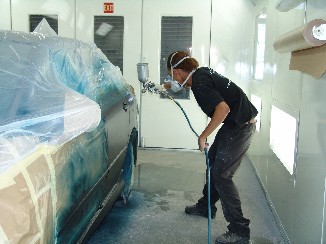Auto body shops are part of a group of smaller sources of pollution known as area sources — smaller activities by businesses or facilities that, when measured across a group of sites, can accumulate to large amounts of pollution impacting Delaware’s air quality.
Contact Us
Area Source Compliance Manager
302-739-9402
What is Regulated?
Volatile Organic Compounds (VOCs)
Regulated reactive VOCs are defined in the definitions section of Delaware’s Air Quality regulations (7 DE Admin. Code 1101). Auto body shop VOC emissions are regulated under Section 11 of the Control of Volatile Organic Compound Emissions regulations (7 DE Admin. Code 1124).
Hazardous Air Pollutants (HAPs)
The regulated HAPs are Nickel (Ni), Cadmium (Cd), Chromium (Cr), Lead (Pb), and Manganese (Mn). Coatings containing these pollutants are regulated under Section 15 of the Emission Standards for Hazardous Air Pollutants for Source Categories (7 DE Admin. Code, 1138).
Methylene Chloride (MCD)
Any auto body shop using methylene chloride for paint stripping operations is regulated under Section 13 of the Emission Standards for Hazardous Air Pollutants for Source Categories (7 DE Admin. Code, 1138).
What is Required?
No Action Required
Those facilities which emit less than 0.2 pounds per day of any air pollutant are exempt from regulatory control. This status must be supported by record-keeping.
Registration
Those facilities which emit 0.2 pounds per day or more, but less than 10 pounds per day, are required to register their pollution-causing equipment. Accurate detailed record-keeping is required to establish and maintain registration status.
Permits
Those facilities emitting 10 pounds per day or more of any air pollutant are required to apply for an Auto Body Source Category Permit using the Digital DNREC ePermitting system.







